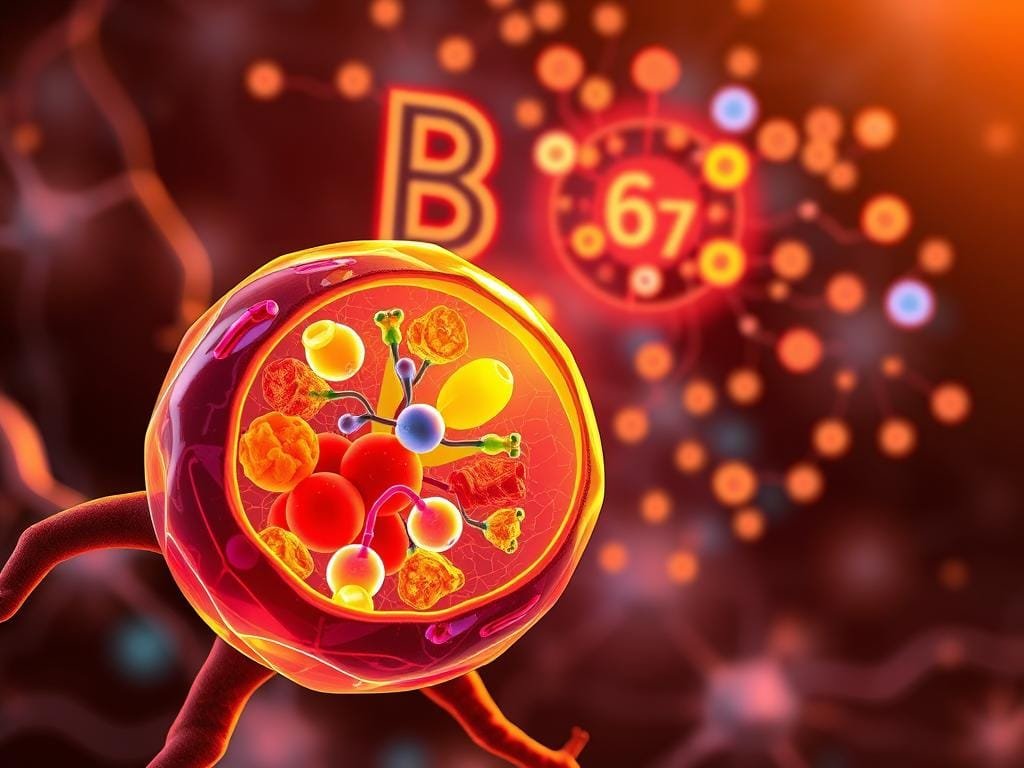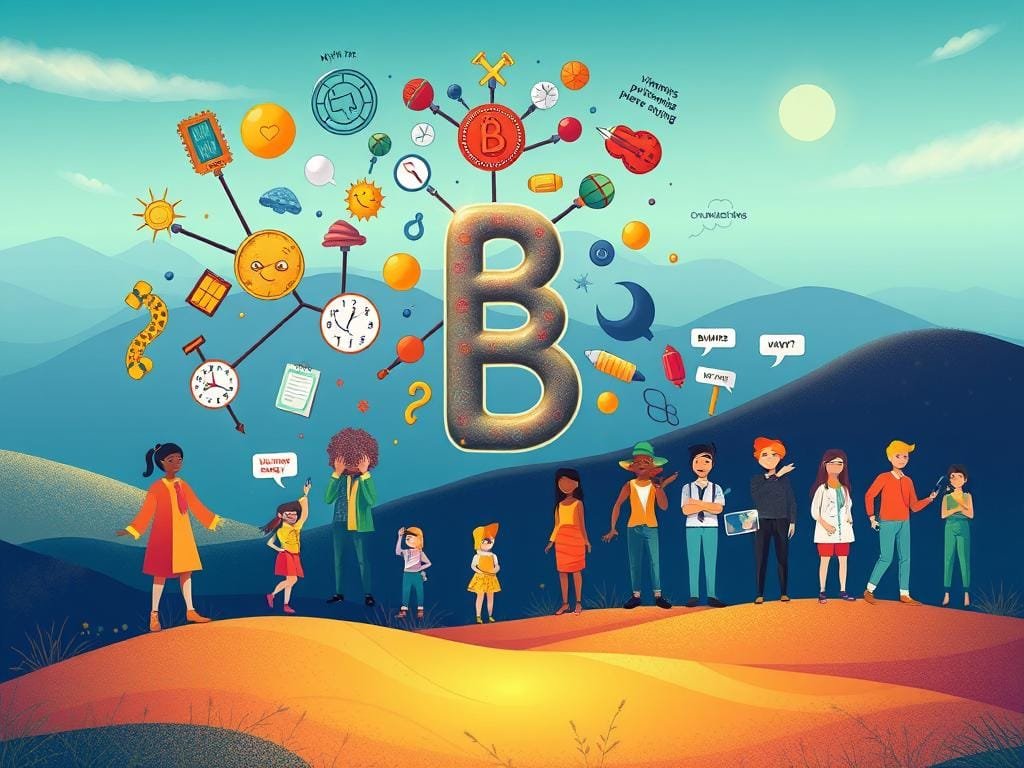Did you know nearly 6% of older adults have a Vitamin B12 deficiency? Over 20% have low B12 levels. This shows how key the B vitamin complex is for energy, nerve health, and overall well-being.
The B vitamin complex includes eight essential vitamins. They work together to support energy production, nerve function, and heart health. A lack of these vitamins can cause weakness, fatigue, and neurological problems.
Having enough B vitamins helps keep your mind sharp, fights fatigue, and boosts vitality. For more on B vitamins, visit Nature Made’s website. Learn about Vitamin B12’s role in energy and nerve health on Boost Healthy Life.
Table of Contents
Key Takeaways
- The B vitamin complex includes eight distinct vitamins essential for energy production and nerve function.
- A deficiency in Vitamin B12 can significantly impact energy levels and cognitive function.
- Vitamin B complex supports cellular energy production and nervous system function.
- Ensuring sufficient levels of B vitamins can help maintain mental clarity and combat fatigue.
- A B-complex supplement can help fill nutritional gaps and support overall health.
What Are B Vitamins and Their Importance?
The B vitamin family is key for many body functions, like energy and nerve health. Knowing about the different B vitamins and their roles helps us see why they’re important in our diet.
Overview of B Vitamin Family
The B vitamin complex includes eight vitamins: thiamine (B1), riboflavin (B2), niacin (B3), pantothenic acid (B5), pyridoxine (B6), biotin (B7), folate (B9), and cobalamin (B12). These vitamins are vital for energy production, nerve function, and heart health.
Key Functions of Each B Vitamin
Each B vitamin has its own role. For example, thiamine (B1) is key for energy production and nerve function. Riboflavin (B2) helps with energy production and may lower disease risk. Niacin (B3) is important for turning carbs, fats, and proteins into energy.
Pantothenic acid (B5) is needed for making coenzyme-A (CoA), a key enzyme for fatty acid synthesis. Pyridoxine (B6) is involved in many reactions, mainly in amino acid metabolism.
Biotin (B7) is important for metabolic processes, like fatty acid synthesis and gluconeogenesis. Folate (B9) is essential for DNA synthesis and repair, and preventing birth defects. Cobalamin (B12) is needed for making red blood cells and keeping the nervous system healthy.
Role of B Vitamins in Energy Metabolism
B vitamins play a key role in turning food into energy. They help your body use the food you eat to make energy.
How B Vitamins Convert Food into Energy
B vitamins are important in the process of making energy from food. Thiamin (B1), Riboflavin (B2), Niacin (B3), Pantothenic acid (B5), and Vitamin B7 (Biotin) help turn carbs, fats, and proteins into ATP. ATP is the body’s energy source.
For example, Thiamin is key in the Krebs cycle, a major energy-making process. Niacin is part of NAD and NADP, important for energy reactions. Learn more about B vitamins’ roles from trusted sources.

The Link Between B Vitamins and Fatigue
Lack of B vitamins can cause energy problems, leading to tiredness. Vitamin B12 deficiency can make you feel very tired, weak, and short of breath. This is because it helps make red blood cells and keeps the nervous system working.
Here’s a table showing how B vitamins affect energy levels:
| B Vitamin | Role in Energy Metabolism |
|---|---|
| Thiamin (B1) | Decarboxylation of alpha-keto acids |
| Riboflavin (B2) | Component of FAD and FMN, vital for redox reactions |
| Niacin (B3) | Component of NAD and NADP, key for redox reactions |
| Pantothenic acid (B5) | Synthesis of Coenzyme-A, important for fatty acid metabolism |
| Biotin (B7) | Carboxylation reactions in gluconeogenesis and fatty acid synthesis |
If you’re always tired, check your B vitamin levels. If low, supplements can help. Look into supplements that fit your needs.
B Vitamins and Nerve Health
The B vitamin complex is key for your nervous system’s health. B6, B9, and B12 are vital for nerve health. They also help with mental clarity and mood.
B vitamins are important for many processes in your nervous system. They help make neurotransmitters, which are essential for nerve signals. Without enough B vitamins, you might feel numb, tingle, or have trouble thinking clearly.
Supporting Nervous System Function
B vitamins help your nervous system in several ways:
- Neurotransmitter Synthesis: B vitamins are key for making neurotransmitters like serotonin and dopamine. These help with mood and thinking.
- Nerve Myelination: Vitamin B12 is important for nerve myelination. This helps nerves send signals well.
- Homocysteine Regulation: B6, B9, and B12 keep homocysteine levels in check. High homocysteine can harm nerves and thinking.
Impact on Mental Clarity and Mood
B vitamins have a big impact on mental clarity and mood. Studies show they can help with depression and anxiety. They affect how neurotransmitters are made and energy in the brain.
“B vitamins are key for brain health and function, affecting both mental clarity and mood.”
A table below shows the main B vitamins and their roles in nerve health:
| B Vitamin | Role in Nerve Health |
|---|---|
| B6 | Neurotransmitter synthesis, homocysteine regulation |
| B9 (Folate) | Homocysteine regulation, neural function |
| B12 | Nerve myelination, neurotransmitter synthesis |
Getting enough B vitamins through food or supplements is important. It helps your nerve health. It also improves mental clarity and mood.
Sources of B Vitamins You Should Include
Eating a variety of B vitamin sources is key for good health. It helps keep your energy up and your nerves healthy.
Natural Food Sources
Getting B vitamins from natural foods is a great idea. Here are some good ones:
- Whole grains like brown rice, barley, and quinoa
- Lean meats such as chicken, beef, and pork
- Fish and seafood, including salmon and tuna
- Eggs and dairy products
- Leafy greens like spinach and kale
- Legumes, including lentils and chickpeas
Eating these foods helps you get all the B vitamins you need. For example, whole grains are packed with thiamin, riboflavin, and folate. A study in the Journal of Nutrition shows how important whole grains are for B vitamins.
“Whole grains are a rich source of B vitamins, and their consumption is associated with a reduced risk of chronic diseases.”
| Food | B Vitamin Content |
|---|---|
| Salmon | Rich in B12 |
| Spinach | High in Folate (B9) |
| Chicken Breast | Good source of Niacin (B3) and B6 |
Fortified Foods and Supplements
Fortified foods and supplements can also help you get enough B vitamins. Many breakfast cereals are fortified with B vitamins. This makes them a great choice. Supplements are also an option if you need extra help.

When picking supplements, talk to a healthcare professional first. They can guide you on what’s best for you. They’ll help you understand the benefits and any possible side effects.
By mixing natural foods with fortified foods and supplements, you can make sure you get enough B vitamins. This supports your overall health.
B Vitamin Deficiencies: Signs and Symptoms
Knowing the signs of B vitamin deficiency is key to addressing health issues. B vitamins are vital for energy, nerve health, and overall well-being.
Common Deficiency Symptoms
Signs of B vitamin deficiency include fatigue, weakness, irritability, and numbness or tingling in hands and feet. These symptoms can make daily life hard.
If you notice these signs, see a healthcare professional. They can find out why you’re lacking B vitamins. Poor diet, health issues, or higher nutritional needs can cause it.
Who Is at Risk for Deficiency?
Some groups face a higher risk of B vitamin deficiency. Vegetarians and vegans might be at risk because their diet lacks animal products, which are rich in B vitamins.
Older adults, people with certain health conditions, and those on certain meds are also at risk. It’s important for them to get enough B vitamins through food or supplements.
How Much B Vitamin Do You Need?
The amount of vitamin B you need daily can change a lot. This depends on many factors. Knowing these factors is key to getting the right vitamin B for your health.
Recommended Daily Allowance
The daily amount of B vitamins you should take varies. It depends on your age, sex, and life stage. For example, pregnant women need more folate to avoid birth defects.
| B Vitamin | Adult RDA | Pregnant Women RDA | Breastfeeding Women RDA |
|---|---|---|---|
| Thiamin (B1) | 1.2 mg | 1.4 mg | 1.4 mg |
| Riboflavin (B2) | 1.3 mg | 1.4 mg | 1.6 mg |
| Niacin (B3) | 14 mg | 18 mg | 17 mg |
| Pantothenic acid (B5) | 5 mg | 6 mg | 7 mg |
Table: Recommended Daily Allowance for B Vitamins
Factors Influencing Your Needs
Many things can change how much vitamin B you need. These include your age, sex, diet, and health. For instance, older adults might need more vitamin B12 because their bodies absorb it less well.
Also, people with certain health issues or taking certain medicines might need different amounts. Always talk to a doctor to find out what you need.
Your needs can be different, so it’s important to know what affects your vitamin B needs.
Mixing B Vitamins: What You Should Know
It’s important to know how B vitamins work together. The B vitamin complex includes eight vitamins that help with energy, nerve function, and heart health.
Synergy Among B Vitamins
B vitamins are more effective when taken together. This is called synergy. They are key for energy metabolism, turning food into energy.
The B vitamins also support the nervous system. B6, B9 (folate), and B12 help make neurotransmitters and keep nerves healthy.
| B Vitamin | Role in Energy Metabolism | Role in Nerve Health |
|---|---|---|
| Thiamin (B1) | Converting carbohydrates into energy | Supporting nerve function |
| Riboflavin (B2) | Energy production and can help reduce fatigue | Maintaining healthy skin and mucous membranes |
| Niacin (B3) | Converting carbohydrates, fats, and proteins into energy | Supporting healthy skin and nerves |
Potential Interactions with Other Nutrients
B vitamins can also interact with other nutrients. For example, vitamin B6 can affect certain medications. Taking too much B6 can be harmful.
When choosing B vitamin supplements, pick a high-quality one. Learn more about the best vitamin supplements for women at Boost Healthy Life.
Age-Related Changes in Vitamin B Absorption
Aging changes how your body absorbs vitamin B, which can lead to deficiencies. As you get older, your body’s ability to take in nutrients like vitamin B can decrease. This is true for vitamin B12, which is key for nerve health and making red blood cells.
How Aging Affects Your B Vitamin Levels
Several factors can make it harder for older adults to absorb vitamin B. These include:
- Less stomach acid, needed to release vitamin B12 from food
- Changes in the digestive system that affect nutrient absorption
- Medications taken by older adults that can block vitamin B absorption
Vitamin B12 deficiency is common in older adults. Look out for signs like fatigue, weakness, and neurological changes.
Strategies for Older Adults
To keep vitamin B levels up, older adults can try these strategies:
| Strategy | Description | Benefits |
|---|---|---|
| Consuming Fortified Foods | Eating foods fortified with vitamin B12, like cereals and plant-based milk | Easy way to increase vitamin B12 intake |
| Supplementation | Taking vitamin B supplements, like B12 | Can help address deficiencies |
| Dietary Changes | Eating more foods rich in vitamin B, like meat, fish, and eggs | Natural way to boost vitamin B levels |
It’s also important to consult with a healthcare provider before starting any supplements to ensure they are necessary and safe.

By understanding how aging affects vitamin B absorption and using these strategies, older adults can keep their health and well-being in check.
B Vitamins and Overall Wellness
B vitamins are key for your health and well-being. They help with energy and keep your immune system, skin, and hair healthy.
Immune function is a big part of staying well. B6, B9 (folate), and B12 vitamins boost your immune system. They help fight off infections. For more on vitamin B complex, check out Healthline’s article.
The Role in Immune Function
B vitamins are vital for a strong immune system. They help make antibodies and activate immune cells. This keeps your immune system ready to fight off sickness.
Links to Skin and Hair Health
B vitamins also benefit your skin and hair. Biotic vitamins, like Biotin (B7), keep hair and nails healthy. They also reduce inflammation and help skin cells regenerate, making your skin look better and younger.
To get the most from B vitamins, eat a balanced diet. Include whole grains, lean meats, fish, eggs, dairy, and leafy greens. Sometimes, supplements are needed, like for those with special diets or deficiencies.
Common Misconceptions About B Vitamins
It’s important to know the truth about B vitamins. Many people think B vitamins are only for energy. But they do much more for our health.

Myths vs. Facts
Some think B vitamins give an instant energy boost. While B vitamins are key for energy, they don’t work instantly. They help turn food into energy over time.
Another myth is that all B vitamins are the same. But there are eight different B vitamins, each with its own role. For example, Vitamin B12 is important for nerves, and Folic Acid (Vitamin B9) helps cells grow and divide.
- Myth: B vitamins are not needed if you eat well.
- Fact: Even with a good diet, some people might need more B vitamins. This could be because of age, diet, or health issues.
Understanding Supplementation
Choosing the right B vitamin supplement is key. Some supplements have just one B vitamin, while others have all eight. Your choice depends on your health needs and goals.
If you want to boost energy, a B complex might be best. But if you have a specific vitamin deficiency, a single vitamin supplement could be better.
| B Vitamin | Primary Function | Food Sources |
|---|---|---|
| Vitamin B1 (Thiamin) | Energy production | Whole grains, legumes |
| Vitamin B12 (Cobalamin) | Nerve health, red blood cell formation | Animal products, fortified plant-based milk |
Knowing the truth about B vitamins and supplements helps you make better health choices. Always talk to a doctor before starting any supplements.
The Future of B Vitamin Research
Research on B vitamins is growing, showing their health benefits. Studies are looking into how B vitamins help our brains and hearts. This new information highlights their role in keeping us healthy.
New Frontiers in B Vitamin Research
New studies are finding out more about B vitamins and health. They’re learning how these vitamins help with energy, nerve health, and more. This research is uncovering important details about their function in our bodies.
Unlocking the Power of B Vitamins
B vitamins offer many health benefits. Keeping up with vitamin B research helps us understand their role in our health. This knowledge lets us use these nutrients to improve our well-being.

